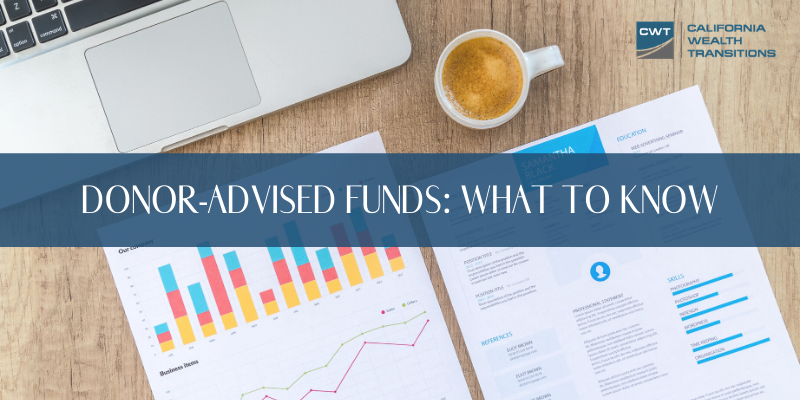Widows often face a significant drop in income after the loss of their spouse, and the IRS offers a few important tax breaks that can help mitigate the loss and improve financial stability moving forward.
Continue readingHow & When to File a Life Insurance Claim
Filing a life insurance claim is a relatively simple process and should be done as soon as possible after the loss of your loved one. Knowing the process is underway may lift some of the financial stress during this time and help you prepare to make decisions about the road ahead.
Continue readingHow Donor-Advised Funds Can Save You Tax Dollars
If you are a charitable investor, a donor-advised fund may be the solution you’ve been looking for. When it comes to the different ways to donate to charity, most people do not know what donor-advised funds are or how they work. Most importantly, many people don’t know how the use of donor advised funds can potentially increase your tax savings over a regular charitable contribution.
For those looking to reduce their taxes in the current year, donor-advised funds are a great way to give back. This type of account allows you to contribute to nonprofits while receiving an immediate tax deduction. Keep reading to learn the basics of donor-advised funds and how to maximize your tax savings.
First, What Are Donor-Advised Funds?
Donor-advised funds (DAF) are a great way pledge assets to charity in the future while instantly receiving a tax deduction. Likewise, “the donor-advised fund essentially functions as a conduit, where the donor receives a tax deduction when the money goes into the DAF, but has discretion about when the assets will finally leave the DAF and actually go to the charity… and in the meantime, assets inside a donor-advised fund grow tax-free,” (Kitces).
While making it easy and quick to contribute and receive a tax deduction, you still must make sure you do your proper research on which donor-advised fund you choose to donate to. Regardless of which donor-advised fund you choose, you will have to pay some fees and expenses depending on the type of charity or nonprofit. The types of charities you can choose to donate to must be IRS-qualified public charities with grant recommendations from the DAF. When you choose a charity, you also have the choice of whether or not your donations will be anonymous, and you can also include a specific purpose or relay a message (i.e. in memory of, in honor of) when donating.
The types of donations you can contribute include cash, checks, publicly traded securities or mutual fund shares, shares of a privately held business, restricted stock, cryptocurrencies, and more. Accepted donation types is determined by the management team of the donor advised fund you select.
So, How Can Donor-Advised Funds Save Me Tax Dollars?
Consider an example, you are charitably inclined and want to contribute $50,000 to charity later this year. You have $50,000 in cash in a savings account and a large investment portfolio. One of the stocks you own has doubled and grown to $50,000 in your investment portfolio. So which do you donate?
You would be subject to capital gains tax if you sold the shares, so you don’t want to sell the shares and contribute the proceeds, you should just contribute the cash in your savings and keep the shares invested right?
Wrong! By using a Donor-Advised Fund you can donate the shares without having to sell them. Therefore, it makes good financial sense to donate the appreciated investments rather than donating $50,000 in cash. By donating stocks instead of cash, you can potentially eliminate the capital gains tax while becoming eligible for a charitable tax deduction equal to the value of the securities. The best part? You can transfer that $50,000 in cash to your investment account and repurchase the same shares you just sold, eliminating the capital gain while keeping the position in your portfolio.
There are other smart money strategies around DAFs such as incorporating it into your investment portfolio’s rebalancing schedule, contributing a highly performing stock and then immediately repurchasing the same shares to avoid the gain as we mentioned above, pre-funding a donation in a high-income year to offset ordinary income taxes, etc.
The sale of a business is a great opportunity for a strategy like this as the year you sell your business is most likely the highest income year of your life. If you were to set aside shares of the company prior to the sale, you could fund a lifetime of charitable giving for you and your family while avoiding capital gains tax on those shares.
Because the rules around donor-advised funds can seem complicated, we are here to help you figure out the best plan of action for your personal situation, all while giving to a good cause. If you would like to speak with an advisor about how you can begin taking action or if you need recommendations for donor-advised funds in Southern California, click here to schedule a quick introductory call.
Fidelity. “What Is a Donor-Advised Fund?” Fidelity Charitable, 2020, www.fidelitycharitable.org/guidance/philanthropy/what-is-a-donor-advised-fund.html.
Kitces, Michael. “Rules & Strategies When Using Donor-Advised Funds.” Nerd’s Eye View | Kitces.com, 1 Feb. 2019, www.kitces.com/blog/rules-strategies-and-tactics-when-using-donor-advised-funds-for-charitable-giving/.
Reducing Taxes For High Income Individuals
Yay! I love preparing taxes!
Wait, we’ve never heard anyone say that before. Except perhaps a CPA who really loves their job.
Why should you care about your taxes when it’s not even the tax season yet? For high earners, this is one area of your finances where you could significantly lose or save money if you have the right knowledge. The more money you earn, the more important your tax planning strategies become.
Tax law is complex, and constantly changing. Unless you’re that CPA we mentioned, you might have trouble figuring out exactly what applies to you and what strategies you could take advantage of to your benefit. A financial professional who has your best interests in mind could help you with tax planning – a financial strategy that starts long before the month of April.
California Wealth Transitions is not a CPA Firm; always consult with your CPA professional regarding the strategies discussed below.
These are situations that can make reducing your taxes a priority when it comes to managing your finances:
Do you have a higher-than-average salary?
Do you own a profitable business or are you self-employed?
Do you own real estate or have real estate you have inherited?
Do you have capital gains?
Pay attention if you want to reduce your income taxes.
Strategies for Reducing Income Taxes
Utilize the Right Retirement Accounts
How you save for retirement can significantly impact your income tax levels. Obviously you want to fully fund any retirement accounts offered by your employer, but if you are self-employed, set up the proper accounts. Anyone can set up a traditional IRA, deductible or non-deductible and you may also be eligible for a ROTH IRA depending on your level of income. If you’re self-employed, consider setting up your own SEP IRA or Solo 401k and contribute as your own employer. This is fully deductible as a business expense. Which one is right for you depends on your Modified Adjusted Growth Income (MAGI) and whether or not you have employees.
Many high income earners already have their basic retirement accounts covered. The question is what accounts to prioritize with your additional saving strategies to make every dollar as tax efficient as possible. Anticipate medical expenses and potentially long-term care expenses by utilizing a Health Savings Account (HSA). A financial professional can analyze pre-tax, backdoor strategies, and after-tax contributions to help you determine where to put your additional funds.
Know What You Own and What You Owe
This sounds like a basic idea, but high earning individuals tend to have many different streams of income and assets in many different forms from insurance policies to real estate. Do you have a statement of net worth that lists all your assets and their value? Is it up-to-date? This is really where tax planning starts. This can also impact your future estate, too – so it’s important!
Use Charitable Donations
Are you inclined to contribute to your favorite charities and gain the tax benefits? You can deduct up to 60 percent of your adjusted gross income each year for these gifts. And guess what…don’t think of charitable donations as cash only. You can donate stock and this could be an advantageous strategy for you especially if you have stocks that have increased in value since you purchased them.
Know What You’re Entitled to as a Business Owner or Real Estate Investor
Ever heard of the 199A deduction? This is a significant deduction that can make a big difference in what you owe. You can deduct up to 20% of the profits of your small business or your rental real estate, allowing sole proprietors, partnerships, and S corporations to reduce taxable income. These are tax deductions, not tax credits and there are certain limitations so check with your tax professional.
Consider Donor-Advised Funds (DAF)
Consider establishing a donor-advised fund, or DAF, which is essentially a personal charitable savings account. A donor can create a fund with contributions in many forms including cash, stock, or other assets and receive an immediate tax deduction for the gift.
To Defer, or Not to Defer … That Is the Question
Many high earners wonder if it’s better to pay taxes now or later. The truth is, if you’re in a top-tier tax bracket now, you most likely will be during your retirement. Deferring taxes now might be taxed at a higher rate in the future. However there are many caveats and nuances to tax deferral. Many high income individuals can benefit from tax-deferred annuity options and life insurance policies as savings vehicles. It really just depends on your individual situation. There is no “one-size-fits-all” answer to this question but it is worth discussing with your financial team.
Protect Your Estate
Do you want to keep as much of your wealth in the family as possible? Of course you do. Consider a Grantor Retained Annuity Trust (GRAT), which can allow you to pass your wealth to the next generation without a significant tax impact. We’ll cover more on protecting your estate to transfer your wealth in our upcoming blog.
Tax planning encompasses a lot of fine tuned strategies that can hold big impact. Our final thoughts on taxes for high earners?
Don’t make panicked decisions at the end of the year in an effort to reduce your taxable income. This is rarely a good move. Consult a professional and start early – get your tax strategy together before the end of the year!
Remember that the IRS isn’t likely to tell you that you’ve overpaid. Perhaps you have your taxes pretty well in line. But have you explored ALL of the options? Trust a professional who has resources at their disposal to get all the pieces of your financial life working together.





